New Wave Titans
How Oingo Boingo, which began as a theatre troupe, forged an endearing legacy and launched the career of one of the most popular film composers of our time.
Hey guys, Ernie here with another piece from David Buck. Last we saw of him, he was talking to Tom Bodett. Tonight, he’s obsessing over an iconic West Coast band. Read on; it's worth it.
Sponsored By … You?
If you find weird or unusual topics like this super-fascinating, the best way to tell us is to give us a nod on Ko-Fi. It helps ensure that we can keep this machine moving, support outside writers, and bring on the tools to support our writing. (Also it’s heartening when someone chips in.)
04/20
The day the Los Angeles city council declared “National Oingo Boingo Day” in 2016. KROQ radio DJ Richard Blade gave a speech honoring the band and recognizing them for their contributions to the 1980s LA music scene. The band performed “Dead Man’s Party” and “We Close Our Eyes” unplugged. They’re interesting renditions, to say the least.
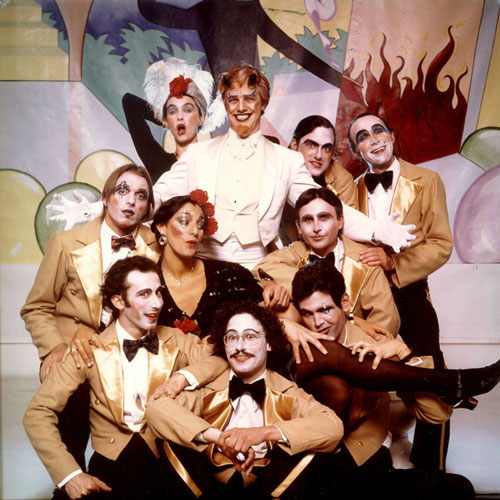
The Mystic Knights of the Oingo Boingo.
A brief history O’Boingo
The band has a long and storied history with the theater. Before Danny Elfman became a full time composer, decades prior to Nightmare Before Christmas and just as new wave was beginning to take off, The Mystic Knights of the Oingo Boingo sprang to life on the Los Angeles music scene.
Filmmaker Richard Elfman put together a large group of musicians to perform covers and original music from—and in the style of—the 1920s through the 1940s, in costume, with vaudeville style antics and skits.
He invited his brother Danny to join the group and play several instruments. They proved to be a massive success—especially among the college crowd—and attracted an audience in the LA area. As the Mystic Knights of the Oingo Boingo, they performed on _The Gong Show_ (they won) and played an important role in Richard Elfman’s film The Forbidden Zone (Danny composed the film score and played the devil).
Eventually, Richard departed the group, leaving Danny to run the show.
The most famous incarnation of the act—known only as Oingo Boingo—featured Danny Elfman on lead vocals/rhythm guitar, Steve Bartek on lead guitar/arranging, John Avila on bass/vocals (replacing original member Kerry Hatch), Johnny “Vatos” Hernandez on drums/percussion, Sam “Sluggo” Phipps on tenor/soprano saxophone, Leon Schneiderman on alto/baritone saxophone and Dale Turner on trumpet/trombone.
The band went through several keyboard players, first with Richard Gibbs, then Mike Bacich and finally with Carl Graves joining them from 1988 until the band dissolved in 1995.
“We were kind of a unique band and it was really a lot of fun,” Hernandez said in a an KABC interview from 2016.
But the era of the band that was perhaps the most interesting was that during the late 1970s, when the act still carried its original name and much of its theater troupe rep.
In 1976, the group released a hilarious and irreverent single about the kidnapping of publishing heiress Patty Hearst and her subsequent joining of the Symbionese Liberation Army.
Dubbed “You Got Your Baby Back,” the song was performed in a 1950s doo wop style— unusual for The Mystic Knights, who were deeply rooted in the music of that 1930s and 1940s. The packaging featured an illustration of Ms. Hearst as both an heiress and a terrorist. Owners could cut out and play with these if they wished. It’s all very tongue-in-cheek.
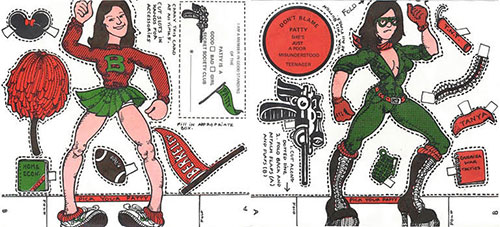
The cover of “You Got Your Baby Back” depicting Patty Hearst before and after the kidnapping
The b-side contains the ear-catching, a capella tune “Ballad of the Caveman.” Clocking in at only a minute and a half, it’s probably the shortest, sweetest love song about cavemen you’ll hear in your life.
For a detailed history of The Mystic Knights of the Oingo Boingo, head over to Night Flight to learn everything you’ve ever wanted to know—and perhaps a few things you don’t—about this early incarnation of the band. Above, listen to a vintage radio ad for a “rare performance of the Mystic Knights of the Oingo Boingo” from 1978 I extracted from my personal collection. (I’m a bit of a nerd for this kind of stuff.)
While Richard Elfman left the band to pursue filmmaking, the brothers still collaborated, with Danny taking a significant role in The Forbidden Zone, his first film.
The film, shot in black and white and later colorized, revolves around the Hercules family, a frog headed man and an evil queen in the Sixth Dimension. Danny played an onstage role as the devil and helped score the film. The movie’s unforgettable theme song was later used as the intro to the Dilbert cartoon.
Shortly after Forbidden Zone came out, Danny shortened the band’s name, set it up as a rock band with a horn section, and the rest is history.
“The press hated us. We were L.A.’s most despised band. Both our image and our attitude conflicted with their image of what “relevant rock’n’roll” was supposed to look and sound like. However, we got so we liked the bad reviews.”
— Danny Elfman, lead singer and composer for Oingo Boingo, speaking of the band’s reputation in the band’s entry in the 1989 edition of The Encyclopedia of Pop, Rock and Soul.
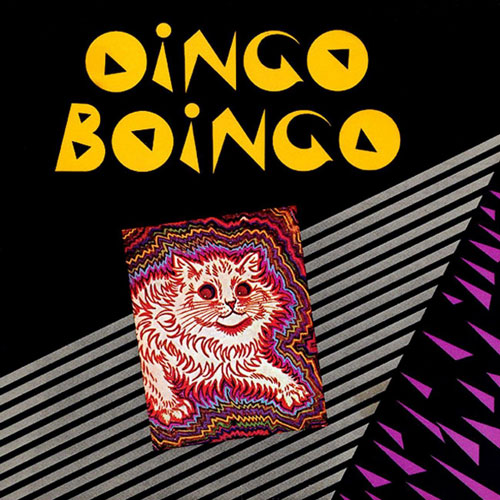
The cover of the band’s debut EP on I.R.S. Records. Psycho Kitty artwork by Louis Wain.
The original new wave punk band
Despite the rancor of critics, the music of Oingo Boingo does tend to grow on you.
The first time I heard their 1981 debut album on A&M Records (prior to this, the band released a four-song EP) Only a Lad, I didn’t know what to think.
Over several repeat listens, however, I began to notice the textures and themes Elfman used in communicating his musical message. Gone were the theatrics of the Mystic Knights, replaced with a hybrid of punk and new wave, juxtaposed in such a way, it created the definitive Boingo sound. If you listen closely, you can hear some of the stylistic flourishes Elfman used in some of his later film scoring work—especially in films directed by Tim Burton.
The album is home to some incredible new wave infused punk music, with occasional harsh and abrasive vocals and highly satirical songwriting. Add to this a combination of African tribal music style and you have a recipe for something truly unique.
The title track alone encapsulates the punk attitude and aesthetic, while failing to conform to the standards of the genre. Have a listen:
Though critics would say the band’s lyrics lack substance, it makes one wonder if they were listening to the same album we, the fans, were hearing. Songs like “Controller,” “Perfect System,” “What You See” and “Capitalism”—most of the album, really—are biting social commentary, performed in a satirical manner. Danny confirms this in several interviews, most recently with The AV Club in 2014.
As a sort of catharsis, Danny rather aggressively attacks the band’s critics in the song “Imposter,” implying the critics are failed musicians and they “don’t believe what they write.”
This new version of Oingo Boingo began to pick up steam on the west coast and were featured in the British film Urgh! A Music War alongside the Police, Devo, The Cramps and many other new wave groups of the time.
As the first of four albums on A&M Records, Only a Lad set the precedent for what to expect from the band. That is, until 1982’s Nothing to Fear arrived and changed everything.
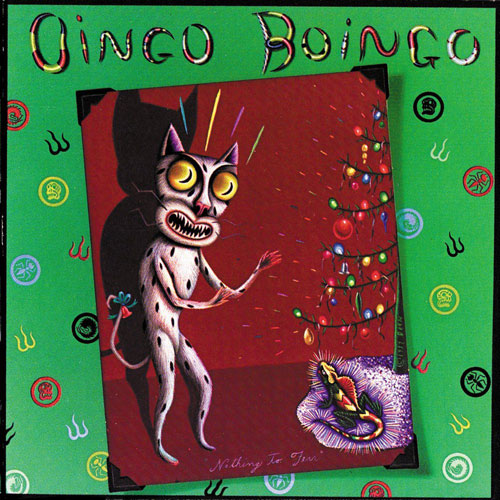
The Cover of Nothing to Fear.
“Just once or twice is good for your soul”: Oingo Boingo’s legend-making mid-‘80s run
Nothing to Fear kicks off with a song about thinking for yourself. The opening song “Grey Matter (on which the boys use special xylophones developed by saxophonist Leon Schneiderman),” begins with Danny telling the listener to ignore the negativity of modern life and to think for themselves. The song is more new wave than punk, and sets the tone for this and the next album, 1983’s Good for Your Soul. The rest of Nothing to Fear explores similar themes and gets a bit cryptic (“Reptiles & Samurai”), goofy (“Insects”) and just plain odd (“Whole Day Off”) at different times. It’s disjointed, but fun.
Both albums feature songs that encapsulate what Oingo Boingo is about—raw, energetic, fun and weird. Though I enjoy each song from the album for different reasons, highlights from Good for Your Soul are the Island of Dr. Moreau recap “No Spill Blood,” “Who Do You Want to Be,” “Sweat,” “Little Guns” and the incredibly socially satirical “Nothing Bad Ever Happens,” which has a hilarious and irreverent music video, featuring early blue screen effects:
Boingo shows their humor in the instrumental “Cry of the Vatos,” which contains a silly backward message. You can hear the original and reversed version here.
Good for Your Soul is a bit darker than its predecessor and the band ended up playing the US Festival in 1983.
They departed A&M records a short time later, signing with MCA Records for their next album Dead Man’s Party. They released three additional albums on MCA, with their final record coming out on GIANT records, a label with its own unique history (tease for a future piece? Maybe!).
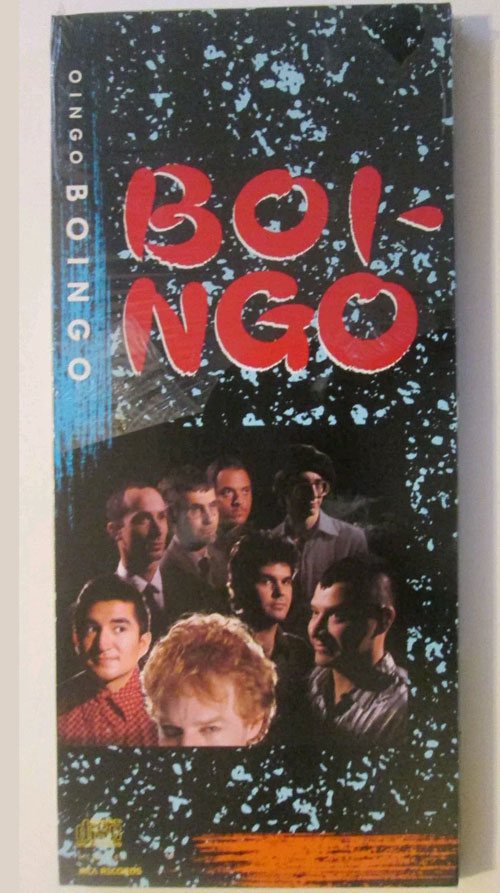
A longbox for the CD version of Boi-Ngo. (We don’t much care for longboxes around here.)
Later albums like the pop and jazz-infused Boi-ngo, the live-on-a-soundstage-with-new-songs Boingo Alive the introspective Dark at the End of the Tunnel and the grungy BOINGO showed the evolution of the band to another form—one that could no longer be reconciled with Danny and Steve’s film scoring/orchestration careers.
1985
The year Dead Man’s Party came out. The album hit #98 on the Billboard 200 and spent 16 weeks on the chart. Some of the band’s best known songs—“Weird Science,” “No One Lives Forever” and the title track—are contained on this album. All three songs have appeared in various films.
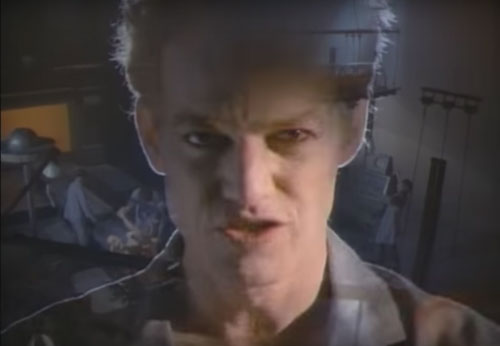
Danny Elfman hates the video for “Weird Science”
The song “Weird Science”—written for the John Hughes movie of the same name—was written by Danny in his head while he was driving. The song helped gain Oingo Boingo some serious radio airplay, but the music video pissed Danny off.
In an interview with The AV Club, he says, “And I think the video was what really soured me. I hated the video. It was the only video I did that I didn’t have anything to do with. I was, at that point, getting busy with other stuff, and I had agreed to show up on a set and, you know, lip sync the song. Everything else I did, I was a part of creating it, or I would even co-direct it. But here I just didn’t, and I was horrified.”
Danny expands upon this a bit more during a 2016 interview with The Huffington Post, where he looks visibly disgusted as the music video plays in the background.
Danny never felt the song was appropriate for Oingo Boingo’s style and didn’t want to revisit the tune, which is why it is difficult to find a live performance of it anywhere, least of all on official Boingo releases. Why don’t you judge for yourself?
“There’s really something kinda strange about you, baby, but I can’t exactly seem to put my finger on it.”
— A lyric from “You Make Me,” Weird Al Yankovic’s style parody of Oingo Boingo, which appeared on his 1988 album Even Worse. Yankovic is a major fan of the band, something something he talks about during a Dr. Demento Show for his 1988 Even Worse album and later mentions in this 2014 Rolling Stone interview. “You Make Me” riffs on several Boingo songs from their early period, most notably “Grey Matter,” although if you listen closely, you’ll hear bits similar to “Only a Lad” in the intro, “Nasty Habits” in the guitar solo and “Who Do You Want to Be” throughout the song.
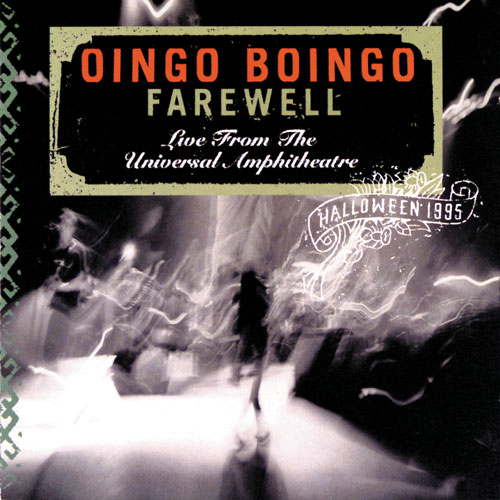
Oingo Boingo got to go out in a big way
When gigging around Los Angeles in smaller venues, Oingo Boingo would often use the name Clowns of Death as a cover. “When we wanted to sneak into a club without anybody knowing who we were, we used that moniker,” Elfman stated in a 1994 AOL chat.
Given that, it’s perhaps fitting that Oingo Boingo played their final show on Halloween night—complete with a song titled “Clowns of Death.” The final performance was recorded for posterity and released on CD and cassette, as well as a double VHS video version, complete with retrospective and aftermath. A DVD of the concert arrived in 2001, but is long out of print. I kick myself often for selling my own copy years ago. For a while, it was one of the few DVDs I owned.
Prior to the Farewell tour, Boingo released the Boingo album, with a markedly different sound from their previous work. It was grungy, depressing and long, stylistically mirroring some of Danny’s film score work—especially in songs like “Insanity,” the beginning of which is reminiscent of the 1989 Batman theme. The cassette version featured an additional song, “Helpless,” because cassettes were able to hold more songs. The same thing happened with the cassette release of the Farewell album.
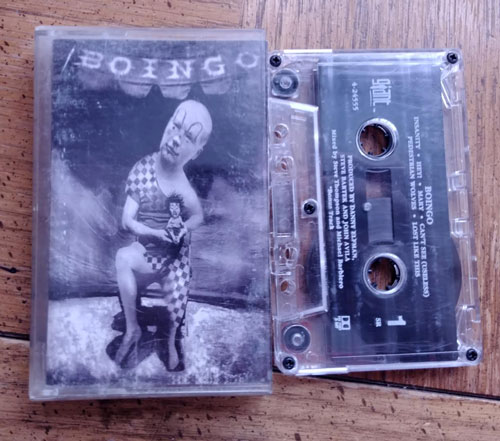
My worn, ancient cassette copy of BOINGO.
Something about BOINGO didn’t quite fit in the Oingo Boingo mold; it didn’t make sense to my ears until 1995 with Farewell, which neatly wrapped up the band’s legacy, complete with backstage interviews with the band members.
During the Farewell show, the band mixes a great deal of their older work with several of the then-recent BOINGO songs, along with four new tunes. It is here, during this performance, where the BOINGO songs finally make sense within the overall context of the group. It’s one wild ride of a concert.
Johnny “Vatos” Hernandez jokes about the end of the band, Leon Shneiderman reminisces about spending half his life in the band and guitarist Steve Bartek maintains his cool, but states, “all the crying is for later.”
2005
The year that Oingo Boingo Dance Party, led by Vatos, was formed. The band features several original band members, including original Boingo bass player John Avila, Keyboardist Carl Graves and Saxophonist Sam “Sluggo” Phipps. The band performs Boingo music—sans Danny Elfman—in retro or nostalgia themed venues. Original Boingo guitarist Steve Bartek occasionally sits in with the band.
The legacy of Oingo Boingo lives on in several ways. Bands like the Aquabats were influenced by Oingo Boingo, even contributing a song to the 2005 Oingo Boingo tribute album Dead Band’s Party. And then there’s the Richard Elfman-approved Oingo Boingo tribute band Dead Man’s Party, who have been around forever and put on one hell of a show, but that’s a story for another time.
Even newer bands like The Radioactive Chicken Heads, who provided a delightful cover of “Surfin’ Bird” on the new incarnation of The Gong Show (unfortunately—unlike the Mystic Knights—they were gonged), carry the torch. And an all female tribute band called Oinga Boinga recently formed in California.
In the over two decades since the Farewell tour, Danny Elfman has continued composing film scores, with Steve Bartek providing orchestration and arrangements for most of them. As time has passed, the band has dived deeper into obscurity—most of the old websites are gone, Steve Bartek’s website is defunct and we’re all much older than we once were.
But something strange happened on Halloween night in 2015—Danny Elfman brought Steve Bartek on stage during a performance and played “Dead Man’s Party” on stage for the first time in 20 years, introducing an entire new generation to the wonderful world of Oingo Boingo.
It really is a dead band’s party. Who could ask for more?
:format(jpeg)/2018/03/tedium031318.gif)
/2018/03/tedium031318.gif)


/uploads/david_new.jpg)